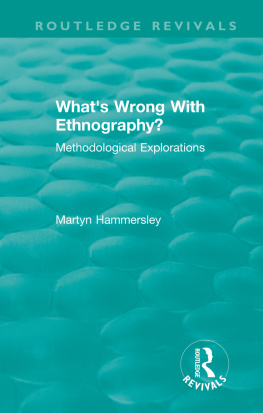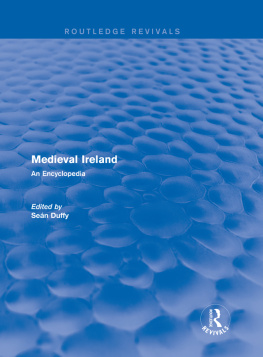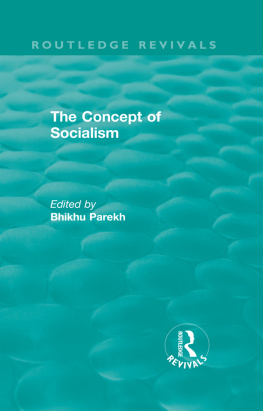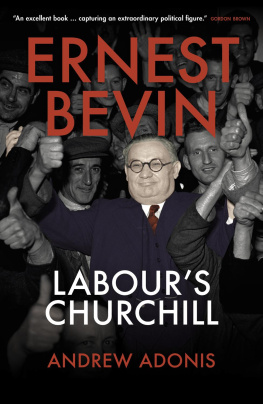Routledge Revivals
Ernest Bevin
First published in 1993, this book presents a biography of a central figure in the development of both the labour movement and British politics in the first half of the twentieth century. This highly accessible account of Bevins life and career was the first to make use of documents pertaining to his activities during the Second World War and bring together numerous secondary studies to posit an alternative interpretation. The book is split into chronological sections dealing with his early years, his time a trade union leader from 1911 to 1929, the beginnings of his involvement in the labour party during 19291939, and his time in office as Minister of Labour and then Foreign Secretary.
First published in 1993
by Manchester University Press
This edition first published in 2016 by Routledge
2 Park Square, Milton Park, Abingdon, Oxon, OX14 4RN
and by Routledge
711 Third Avenue, New York, NY 10017
Routledge is an imprint of the Taylor & Francis Group, an informa business
1993 Peter Weiler
The right of Peter Weiler to be identified as author of this work has been asserted by him in accordance with sections 77 and 78 of the Copyright, Designs and Patents Act 1988.
All rights reserved. No part of this book may be reprinted or reproduced or utilised in any form or by any electronic, mechanical, or other means, now known or hereafter invented, including photocopying and recording, or in any information storage or retrieval system, without permission in writing from the publishers.
Publishers Note
The publisher has gone to great lengths to ensure the quality of this reprint but points out that some imperfections in the original copies may be apparent.
Disclaimer
The publisher has made every effort to trace copyright holders and welcomes correspondence from those they have been unable to contact.
A Library of Congress record exists under LC control number: 92002494
ISBN 13: 978-1-138-67565-0 (hbk)
ISBN 13: 978-1-315-56049-6 (ebk)
Ernest Bevin
Peter Weiler
MANCHESTER UNIVERSITY PRESS
Manchester and New York
Distributed exclusively in the USA and Canada by St. Martins Press, New York
Copyright Ernest Bevin 1993
Published by Manchester University Press,
Oxford Road, Manchester, M13 9PL, UK
and Room 400, 175 Fifth Avenue, New York, NY 10010, USA
Distributed exclusively in the USA and Canada
by St. Martins Press, Inc., 175 Fifth Avenue, New York, NY 10010, USA
British Library Cataloguing-in-Publication Data
A catalogue record for this book is available from the British Library
Library of Congress Cataloging-in-Publication Data
Weiler, Peter, 1942
Ernest Bevin / Peter Weiler.
p. cm. (Lives of the left)
ISBN 0719021782 (hardback)
1. Bevin, Ernest, 18811951. 2. Statesmen Great Britain
Biography. 3. Labor leaders Great Britain Biography. 4. Great
Britain Foreign relations 1945 I. Title. II. Series.
DA585.B4W44. 1993
941.085092dc20
[B]922494
ISBN 0 7190 2178 2 hardback
Set in Perpetua
by Koinonia Ltd, Manchester
Printed in Great Britain
by Bookcraft (Bath) Limited
Contents
To Kathleen, Sarah and Emma with love
To anyone familiar with the history of the British labour movement in this century, Ernest Bevin needs no introduction. Shortly after the First World War, he founded the Transport and General Workers Union, which was long the largest trade union in Britain. He was, with Trades Union Congress General Secretary Walter Citrine, largely responsible for the direction that the British trade union movement took after the General Strike of 1926. After the financial crisis of 1931, he played a significant role in the reshaping of the Labour Partys policy that became the basis of the programme enacted by the 1945 Labour government. In 1940, aged fifty-nine, he began a new career, overseeing the wartime governments labour policies and in the process contributing to the creation of the postwar welfare state. After the war, in what to many contemporary observers seemed the most surprising move of his long career, Bevin served as Foreign Secretary in the 1945 Labour government, helping to shape the international order that prevailed for the next forty years. In short, Bevins career was centrally important to the development of both the British labour movement and British politics in the first half of the twentieth century.
A biography necessarily imposes order on the complexity that is any individuals life. In this instance, while trying to do justice to the multifaceted nature of Bevins career, I have employed two related concepts, labourism and corporatism, used by many other historians to explain the shape taken by the British labour movement. When Bevin began his career in the labour movement at the beginning of the twentieth century, the direction that movement would take was not fixed. Although predominately moderate in outlook, the movement contained tensions between a visionary desire to transform capitalist society and a need to make an accommodation with that society for the sake of immediate economic gains. The drive towards accommodation, which nevertheless went along with a strong sense
These contradictory impulses toward transformation and accommodation also marked the life of Ernest Bevin, particularly his early career. Bevin was deeply conscious of his own subservient position within British society and filled with a corresponding anger at its unfairness. This anger led him at times to a vision of a socialist commonwealth but more often towards a desire for acceptance by society. Bevins dominant concerns derived from his work as a trade union leader to protect the living standards of his followers and secure recognition of the trade union movement. To accomplish these goals, he became a proponent of a particular labourist strategy that has come to be called corporatism, the arrangement in which trade union leaders explicitly accept the limits of the capitalist economy and work to secure a partnership with capital and the state, trading labour peace for recognition and influence. After the General Strike of 1926, Bevin played a crucial role in turning the labour movement toward a corporatist path and away from direct action, the use of organised working-class power to secure political changes, and the syndicalist ideal of direct workplace democracy.
Since Alan Bullock has written a three-volume biography of Bevin, why write another one? One reason is that Bullocks biography is so massive that only specialists read it. There are no other scholarly biographies of Bevin, only journalistic accounts. Moreover, although Bullocks impressive biography remains definitive as a narrative, it is written very much from Bevins point of view, since Bullock shared the labourist and corporatist ideals of his subject. Bullocks stance is that of a Labour loyalist from a generation for whom Bevin was a hero.
A second reason is that documents about Bevins life are now available, particularly for the Second World War, which were still closed when Bullock was writing. In addition, numerous new secondary studies about the period during which Bevin lived have provided additional data for most of the key moments in his career. All of this new information makes possible alternative interpretations of Bevins life and work. For the sake of brevity, however, I have neither cited all the scholars whose work I have used nor indicated how I have entered into a number of historical debates about the British labour movement and British political developments. Specialists will recognise both my intellectual debts and the historiographical arguments; for others, it would be an unnecessary distraction.










